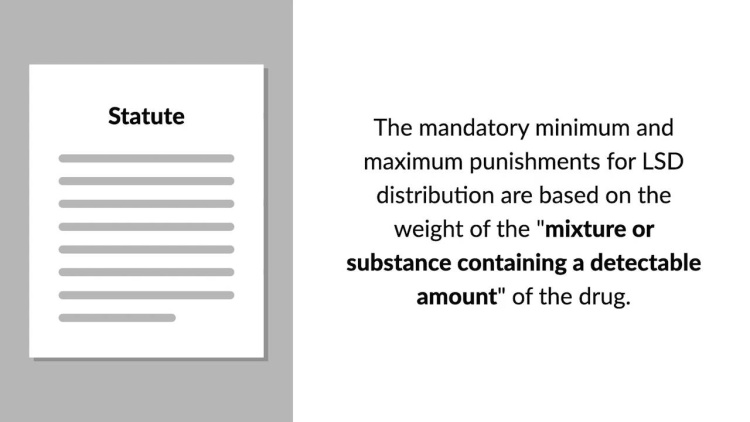United States v. Marshall
United States Court of Appeals for the Seventh Circuit
908 F.2d 1312 (1990)
- Written by Lauren Petersen, JD
Facts
Stanley Marshall and three others (defendants) were convicted of distributing or intending to distribute lysergic acid diethylamide (LSD). The defendants were given prison sentences ranging from five to 20 years, based on mandatory minimum periods of imprisonment established by the Controlled Substances Act (CSA), 21 U.S.C. § 841. The CSA determined minimum sentences in accordance with the weight of the mixture or substance containing a detectable amount of the illegal drug. The defendants all challenged the calculation of the weight of the drugs. The amount of pure LSD in one dose is so small that LSD is sold on a separate carrier. Typically, LSD is dissolved into a solvent and then placed onto paper or gelatin. The trial court had included the paper sheets on which the LSD was sold as part of the mixture or substance containing a detectable amount of LSD, thus including the paper in the weight of the LSD for purposes of calculating the mandatory minimum sentence. The defendants appealed to the United States Court of Appeals for the Seventh Circuit.
Rule of Law
Issue
Holding and Reasoning (Easterbrook, J.)
Dissent (Cummings, J.)
Dissent (Posner, J.)
What to do next…
Here's why 911,000 law students have relied on our case briefs:
- Written by law professors and practitioners, not other law students. 47,100 briefs, keyed to 997 casebooks. Top-notch customer support.
- The right amount of information, includes the facts, issues, rule of law, holding and reasoning, and any concurrences and dissents.
- Access in your classes, works on your mobile and tablet. Massive library of related video lessons and high quality multiple-choice questions.
- Easy to use, uniform format for every case brief. Written in plain English, not in legalese. Our briefs summarize and simplify; they don’t just repeat the court’s language.





